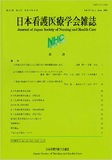Japanese
English
- 有料閲覧
- Abstract 文献概要
- 参考文献 Reference
要 旨
本研究の目的は、在宅高齢者に対して「食べる」という行動を促進することによって栄養状態の維持および向上を目指した栄養マネジメントプログラムの導入と、その有効性を評価することとした。対象は、訪問看護を利用する在宅高齢者で、無作為に介入群と対照群に分け、介入群のみに栄養マネジメントプログラムを提供した。プログラムは、食事摂取量の目標の設定、栄養チェックシートへのスタンプ押印、目標を達成した場合の言語的賞賛で構成した。評価指標はMini Nutritional Assessment Short Form(MNA-SF)、口から食べるバランスチャート(KT index)、栄養量とした。分析対象者は8名であり、介入群4名中、MNA-SFは2名、KT indexは3名、栄養量のエネルギーは3名が増加した。また、栄養量のエネルギーにおけるANOVAの結果、主効果および交互作用はみられなかったが、介入前後における変化率は、介入群では117.0%、対照群では87.3%であった。対照群と比較して介入群における栄養量のエネルギーの変化率が高率を示したことから栄養マネジメントプログラムの有効性が示唆された。
The purpose of this study was to formulate a nutritional management program aimed at maintaining and/or improving nutritional status by promoting the “eating” behavior of community-dwelling older adults and evaluate the effectiveness of the program. The participants were community-dwelling older adults using home nursing care services. They were randomly divided into an intervention group and a control group. Only the intervention group was provided with the nutritional management program, consisting in goal setting in dietary intake, nutrition check-sheet stamp, and verbal praise provided when a goal was achieved. The nutritional status evaluation indicators were the Mini Nutritional Assessment Short Form (MNA-SF), Kuchikara Taberu balance chart (KT index), and nutrition quantity. Eight participants were included for analysis. The results of the nutritional status evaluation of four participants in the intervention group showed an increase in MNA-SF in two participants, KT index in three participants, and the energy of nutrition quantity in three participants. The main effect and interaction for the energy of nutrition quantity between groups and timing was not found using an analysis of variance (ANOVA). However, the rates of change before and after intervention for the energy of nutrition quantity were 117.0% for the intervention group and 87.3% for the control group. The nutritional status improved in the intervention group compared to the control group, and the rate of change in the energy of nutrition quantity was higher in the intervention group. These effects suggested the effectiveness of the nutritional management program for community-dwelling older adults.
Copyright © 2021, Japan Society of Nursing and Health Care All rights reserved.


